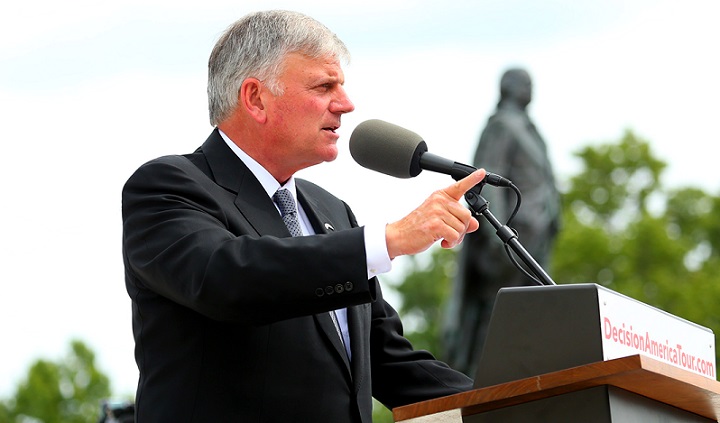
RNA - The nation's largest Muslim civil rights and advocacy organization has urged President-elect Donald Trump to drop Rev. Franklin Graham from the list of those invited to pray at the presidential inauguration due to the evangelical leader's continued criticism of Islam.
In a statement released on Thursday, the Council on American-Islamic Relations (CAIR) said Graham's appearance at the January 20 event will only cause further division across America.
"If President-elect Trump truly seeks to unite our nation as he promised in his acceptance speech, he will limit the list of those offering prayers at the inauguration to religious leaders who work to bring us together, not to create divisions between faiths," said CAIR National Executive Director Nihad Awad. "Rev. Graham's ill-informed and extremist views are incompatible with the Constitution and with American values of religious liberty and inclusion."
Graham, the leader of the Billy Graham Evangelistic Association and Samaritan's Purse and the son of famed evangelist Billy Graham, has been accused of "Islamophobia" and of "waging a campaign against Islam, against the rights of Muslims" by a number of groups due to his continued criticism of the religion.
In addition to calling Islam a "false" and "very evil and wicked religion", the evangelist has said Muslims are "enslaved by Islam" and last year slammed President Obama for visiting a mosque as "the foundations of this nation have nothing to do with Islam".
He has also suggested that American mosques could be closed and Muslim immigration into the United States "be stopped until we can properly vet them or until the war with Islam is over."
"Every Muslim that comes into this country has the potential to be radicalized - and they do their killing to honor their religion and Muhammad," Graham wrote. "During World War 2, we didn't allow Japanese to immigrate to America, nor did we allow Germans. Why are we allowing Muslims now?"
Due to the ongoing number of terror attacks carried out by Muslim extremists around the world, Graham said "Islam has declared war on the world, and it's high time we acknowledge it and respond decisively."
"I don't know about you, but I don't want to live under Islam. I will bow my knee to no one except Almighty God," he wrote.
However, Graham has also called on people of all faiths to respect one another - whether they agree or not.
"As a Christian I'm offended when people mock my Lord and Savior, Jesus Christ," Graham explained. "Muslims are offended when people mock their faith. I disagree with Islam. But just because I disagree, I'm not going to mock them or resort to violence. We need to show respect to people of other races and beliefs. What happened to civility and respect?"
Graham, who previously prayed at the inauguration of George W. Bush in 2001, will join televangelist Paula White, Samuel Rodriguez and other prominent faith leaders in offering prayers and Bible readings at the inauguration ceremony.
While he never endorsed any particular candidate during election season, the evangelist voiced his support for Trump on several different occasions and has said there is "no question" God had a hand in electing the businessman to the White House.
During a recent appearance on Fox & Friends, Graham said that Americans are tired of the "secularist" federal government that has a "humanistic, atheist" agenda.
"They were praying that God would change this and put somebody in the White House that believed in God, and would listen to God's voice," Graham said. "I believe - no question - that God's hand was in it," he said.
Nevertheless, as America is still in "great trouble" and plagued by division, Graham said that he hopes America can come together "as Americans" for Trump's inauguration like the country has for past presidents, including President Obama.
"Now, we need to help this nation move forward," he said.
Graham's statements on Islam and continued criticism of Muslims haven't sat well with everyone in the evangelical community, however, including Russell Moore, president of the Southern Baptist Convention's Ethics and Religious Liberty Commission, who called his proposed ban on Muslims entering the United States "reckless, demagogic rhetoric."
"Most evangelicals understand the difference between the peaceful Muslims and those who are violently waging war against us, because we're a people on mission," Moore told NPR. "We have Muslim neighbors and Muslim friends, and we understand how to love them, treat them with dignity, even as we disagree and have those conversations."
Mark Labberton, President and Professor of Preaching at Fuller Theological Seminary, has also encouraged Christians to demonstrate openness, understanding and love when interacting with their Muslim counterparts and said coexistence between the two groups is possible - and even necessary.
"Christians and Muslims need to understand one another," he said. "We all know that certainly since the turning of the millennium and all the events that have happened since that time, there have been many reasons that the public conversation about Christianity and Islam has garnered all kinds of attention. Some of it has been helpful, but the vast majority of it, in my view, has largely been about stereotyping and insult and even war rather than mutual understanding, peace, respect, and justice."
847/940